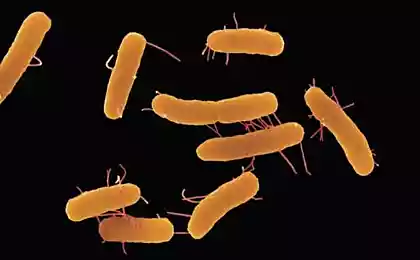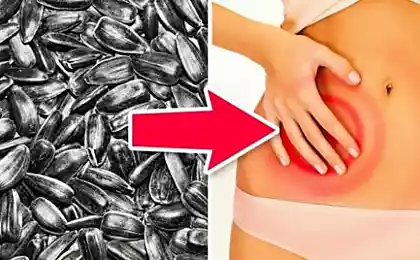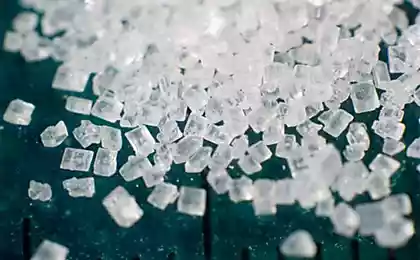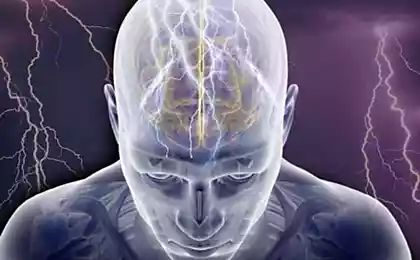693
The myth about fat: why excess threat
The first thing I want to say that fiber is definitely useful, but it can not be questioned. But like other bioactive compounds, the benefits only normal fiber intake (within normal limits).
The absolute majority of scientific research was not conducted on supplements of fiber, and fruits and vegetables. We cannot equate the bare fiber and the containing fruits and vegetables!!! Increasing the amount of fiber higher than normal does not increase its useful effect, but only leads to health problems.
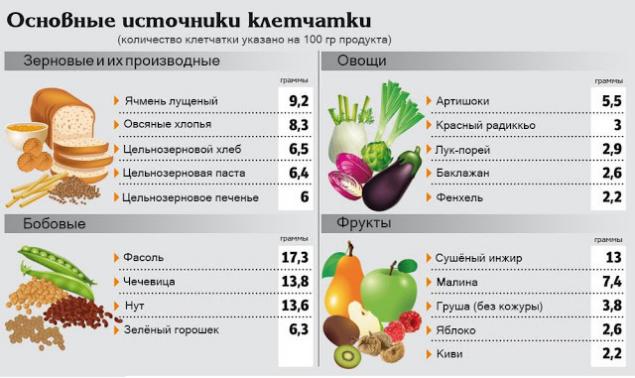
Norma fiber.
In nutrition it is considered that the daily intake of fiber for an adult should be 25-30 g (or 10-13 g per 1000 kcal). There are two types of fiber: insoluble and soluble. Insoluble intact completely eliminated through the intestinal tract. Her presence has a positive effect on increasing the volume of stool and the regulation of the rhythm of bowel movement. A lot of fiber in wheat bran and flour products from wheat flour.
Now the U.S. has developed some restrictions regarding consumption of food fibers: for men over the age of 50 years, their number should be no more than 38 grams per day, and for those men who have crossed this age limit, it is recommended to reduce this figure to 30 grams. Women who have not reached the 50 year milestone, you should consume 30 GM of fiber and those over 50, it takes less than 21 grams.
Fiber intake above 50 grams per day leads to negative effects!
As for children, the initial dose is 10 GM, to which is added the number of grams equal to the age of the child. For example, 9-year-old child should consume in a day, 10+9, that is 19 GM dietary fiber daily.
Soluble fiber on the one hand, is able to swell in water, hold the water and quickly give a feeling of satiety, and on the other hand, it reduces the absorption of fats, glucose and bile and promotes the growth of normal intestinal microflora. Its a lot of plums, carrots, citrus fruits, legumes.
According to the concepts of nutrition, nutrition in the total number of fiber soluble should not be less than 3/4. In most plant products are the two forms of fiber at the same time.
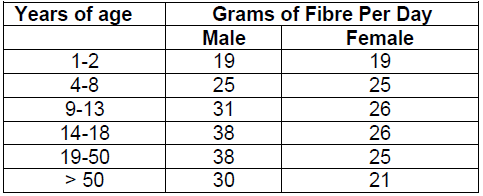
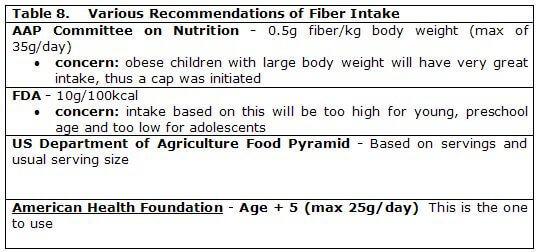
Fiber enough!
Any little bit of balanced diet contains enough fiber! For example, in a plate of pea soup or beans contains at least 20 grams of fiber – it's almost the daily recommended allowance (!). Therefore, it makes sense to eat foods rich in fiber or to use an excess of whole grain products.
Example of bread: rye Bread brand "Generous". Ingredients: rye flour bakery flour, wheat bran, wheat flour of second grade, drinking water, margarine. Baking yeast, salt, malt, rye. Composition: the Calorie content of these crisps 100 g is 360 kcal, Protein 10 g, fat – 4.5 g, carbohydrates – 70 grams fiber – 18,4 g
Only 100 grams of bread contain more than half the daily value of fiber (!) Not even considering the rest of the diet!
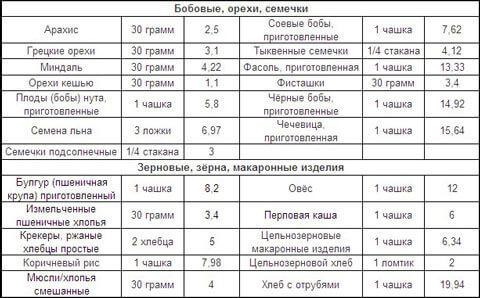
The creation of the myth about fiber.
In 1979, an Irish physician, Dr. Denis Parsons Burkitt published a book "don't forget the fiber," which became an international bestseller. In 1984 the Kellogg Company adds a statement about health on the packaging of your cereal "All-Bran".
In 1990, the U.S. Congress adopts a law on the labelling of foods requires food producers to measure the content of fiber and put information about it on the packaging. In 1990, the American society of cancer the first release recommendations on reducing the risk of cancer, including the advice to eat more fiber.
The myth about fiber is that use of vegetables and fruit is transferred to the fiber (substitution of concepts). The creators and promoters of this myth is that many manufacturers of Breakfast cereals, "of whole grain products, etc. it is claimed that the fiber really reduces the risk of many diseases.
Currently, lobbyists, talking about the benefits of consuming fiber, point to several small-scale studies supporting their arguments that fiber (not vegetables!) helps with heart disease and some other diseases. Unfortunately, the history of medical research has shown again and again that we need to be very careful with the results of small scale studies because they can reflect a simple coincidence.
Fiber and digestive problems.
If your diet dramatically increased the amount of fiber, you may encounter such problems as flatulence, diarrhea, pain and bloating — this causes discomfort.
Here is what microbiologist Paul McNeil Paul McNeil) at the Medical College of Georgia: "When you eat food rich in fiber, it moving along the gastrointestinal tract, injures epithelial cells of the serous membrane. These injuries lead to increased production of mucus, which has soothing and protective properties.". Of course, there is a limit on receiving "coarse" plant foods rich in fiber.
The digestive organs do not produce enzymes capable of degrading the sheath of plant cells. Some microbes of the large intestine (Clostridium, V. cellulosae dissolvens, B. mesentericus vulgatus) have such enzymes and therefore break down cellulose. At the normal rate of movement of food through the digestive tract microbes digest about 3/4 of the entire fiber, if it is taken not in excess.
But there are condition when even normal digestible cellulose are not normally digested. The fact that plant cells are interconnected by a layer of pectin for dissolution which requires first the acid reaction of the gastric juice, and then lightly alkaline duodenum. In the absence or lack NS in gastric juice the cells of digestible fiber (e.g., potatoes, carrots) together, which means they remain undigested.
To protect against mechanical damage caused by undigested food, epithelial cells as adaptation begins to secrete much more mucus. Secreted mucus serves to protect the outer cells of the mucosa. In addition, it promotes rapid recovery of damaged outer membrane and facilitates the movement of food through the digestive tract.
Excess fiber impairs absorption of micronutrients.
Fiber promotes the movement of undigested food through the digestive tract, while reducing the level of assimilation of nutrients by the intestinal wall. If we start to consume more than 50-60 grams of fiber a day, our body will fail to absorb sufficient amounts of the essential trace elements and nutrients before undigested food leaves our body.
Fiber gives a feeling of satiety for a long time, helping us thus to lose weight and keep a desirable body weight. If for us adults, this effect is very favorable, for kids, in case of excessive consumption of dietary fiber, it is not helpful, as it may not be the best way impact on their health. In this situation, the child feels satiated and refuses to eat the amount of healthy food that it needs for normal development and growth.
However, excess dietary fiber (25-40 g/day) can significantly inhibit the absorption of iron, calcium, zinc and other important elements.Especially from an excess of fiber affects children. Soya baby food inhibits the absorption of zinc. And zinc is essential for brain development. Depression, pathological loss of appetite, low birth weight, delayed growth, mental development and amenorrhea – all of them are connected with zinc deficiency, and the first 5 of these symptoms are also associated with iron deficiency.
In England the passion plant food products for children led to a massive epidemic of rickets. And only a return to the diet of dairy and meat products allowed to deal with this deficiency. A leading expert on fiber, Professor David Southgate, believes that infants, children, adolescents, and pregnant women should refrain from the excessive consumption of fiber. These categories of people have a great need in minerals than the rest of the population. Fitini fiber "robbing" the absorption of minerals.
Zinc deficiency, a symptom of which is a significant delay of growth and puberty, was first described in children and male adolescents in Egypt, Iran and Turkey. The diet of the inhabitants of the Middle East usually contains a lot of fiber and Filatov, impeding absorption of zinc.
Deficiency of zinc in the body especially common in countries with low income due to insufficient consumption of foods rich in zinc (mainly foods of animal origin), or because of low suction in connection with the binding of the zinc fiber and fittoni, which are present in cereals, nuts and legumes.
Fiber also reduces fat absorption that, in turn, causes reduction of intake of fat — soluble vitamins- A, D, E and K. There is evidence that plant fiber can reduce the absorption of such compounds as selenium, beta-carotene, and vitamin B2.
Fiber reduces the risk of colorectal cancer.
For example, in the course of their studies failed to identify any relationship between colorectal cancer and intake of dietary fiber or fruits and vegetables. In January 1999, ABC World News reported on a sensational publication.
The New England Journal of Medicine published the results of a massive study of 88 thousand people over 16 years and showed that for prevention of colorectal cancer fiber is useless. This news was printed in the edition of the New York Times.
Scientists testing a hypothesis (note, has not confirmed the hypothesis) Dr. Denis Burkitt, who based on the observations of the food of people in Africa have suggested that the low incidence of rectal cancer associated with the use of fiber.
Harvard Professor Dr. W. Willett reported that fiber intake has no influence on either the incidence of colon cancer or of benign prostatic hyperplasia. The myth about fiber continues to circulate, despite ample evidence that fiber-rich grains are guilty of the emergence of a number of gastrointestinal diseases, including colon cancer.
No one questioned the antioxidant properties of fiber. In recent years more and more talk about the important role of cellulose as the binding and elimination of toxins. In particular, it binds and excretes estrogens and estrogen-like substances. In our time of continuous application of chemicals, the role of fiber is particularly important. It is also important that the fibre prevents sharp rise in blood sugar level.
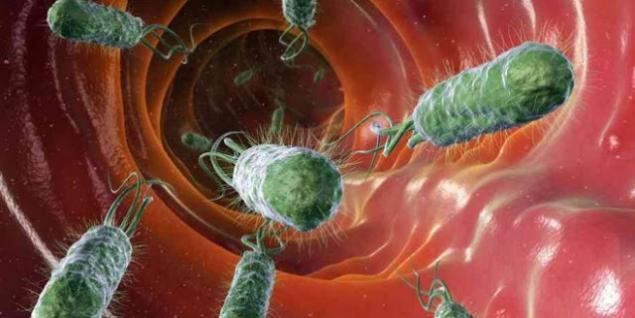
Along with the results of other studies of colon cancer and breast cancer "Study health of nurses" has created more confusion and was almost completely discredited the idea of the correlation between diet and cancer.
After several decades of work, Professor Walt Willett said: "...increase the consumption of fruits and vegetables in General don't seem as effective way to significantly reduce the risk of cancer... apparently, the benefits from the consumption of these products] is manifested to a greater extent for cardiovascular than for cancer diseases".
Fiber helps to lose weight.
Nutritionists traditionally recommend persons suffering from obesity or having excess body mass, to increase the proportion of dietary fiber in your diet. It is assumed that foods rich in fiber will cause a feeling of fullness due to reflex stimulation of the receptors of the gastric wall and this will allow longer-lasting feeling of satiety due to slow evacuation. Recall that the long chains of polysaccharides that make up dietary fiber are not digested by enzymes the human digestive tract, but can be cleaved under the influence of the intestinal microflora.
For those who want to control your body mass produced special products enriched with dietary fiber, including various candy bars for snacks that are designed to quickly satisfy hunger, but not too high energy value.
However, according to the study, published in July 2012 in the online version of journal of the Academy of Nutrition and Dietetics, the consumption of these products is not too helps to stick to a diet.
To determine the effect of proportion of dietary fiber in the diet on the volume and energy value of consumed food, the researchers offered 22 healthy young women without dietary restrictions at the time of the study, consumed on a daily basis specially manufactured bars.
Of 5 offer 4 varieties contained different dietary fiber (10 g oligofructose, or inulin, or soluble corn fiber or resistant wheat starch), and 1 was a normal chocolate bar.
Every kind of sweets offered to women after dinner, and then after Breakfast the next day. After this, the women dined in a research laboratory, where he assessed their feelings of hunger, satiety, "full stomach" on a standard scale. In addition, the recorded inventory of all food eaten during the day products.
It turned out that in those days, when women ate only "useful" sweets, and other days the volume and energy value of the food consumed remained virtually unchanged. In addition, by interviewing participants of the research, it was found that these bars do not create the additional feeling of satiety and does not affect the sensation of hunger. Of the side effects noted slightly pronounced bloating and flatulence complained mostly after eating fiber.
The excess vegetables also helps weight loss
American scientists undertook to check the validity of the basic recommendations of nutritionists to lose weight, there are 1 to 5 daily servings of fruits and 2-3 servings of vegetables."
The study involved over a thousand people. The results showed that such diets the expected efficiency is not encouraging. The study compared the "vegetable" diet and Mediterranean – based on olive oil and seafood. It turned out, the second worked better.
Moreover, the cores that followed the Mediterranean diet, a 30% resperidal heart attack. Catherine Kaiser – head of the research group – affirms that the simple replacement of conventional products with fruits and vegetables is not effective. Conclusion: now focus on vegetables and fruits, often forget about other equally important elements of the diet.
Excess fiber, cleansing and constipation.
Very often people try to solve the problem of constipation by increasing the amount of fiber. This is wrong. Moreover, the fiber, especially with an insufficient amount of water (2 liters per day) cause constipation by itself. In addition, physical inactivity and sedentary lifestyle are two causes of constipation.
Many doctors and their patients genuinely believe that the engine of the intestinal content is fiber. Indeed, the increase of specific weight of fiber in the diet, in some cases, increases the frequency of bowel movements. However, it does not suspend the need to use laxatives and it won't ease the pain of defecation. Fiber promotes intestinal contents by mechanical pushing. Pure physics, no physiology.
Turned out to be the opposite: recent studies have shown that the restriction of fiber in the diet led to relief of constipation. This applies primarily insoluble fiber. The reason for this effect is that nature has not endowed man with the enzymatic capacity to digest cellulose.
Recently foreign doctors insistently advise to include every day in your diet plenty of fiber because it effectively cleanses the colon almost like a broom that sweeps everything in its path. But this is a huge misconception.
Fiber is probably like properties of sand paper which irritates the intestine and causes him to excrete slime, which partially protects, but also prevents the absorption of nutrients from food. People who for many years included a large amount of fiber in your diet, the intestines are formed scars, which later become the cause of many problems.
If you will sharply begin to increase the intake of fiber, by the same token you don't let your stomach and intestines time to get used to such excess, and this can lead to undesirable effects – diarrhoea, bloating and excessive flatulence.
Experts recommend to increase the intake of fiber gradually over several weeks until the daily dose reaches recommended standards. Besides it is necessary to remember that dietary fiber must enter into your body from a variety of foods – fruits, vegetables, legumes, nuts, cereals, so that your diet meets all the requirements of proper nutrition.
Moderation.
All should comply with the measure. Of course, fiber has a positive effect on various processes in our body, but this does not mean that you should abuse it. If you have no medical contraindications, you can make in your diet the recommended amount of this substance — take advantage of these benefits. There is no need to apply any special supplements — just normal products.
For example (values are for 100 g of product):
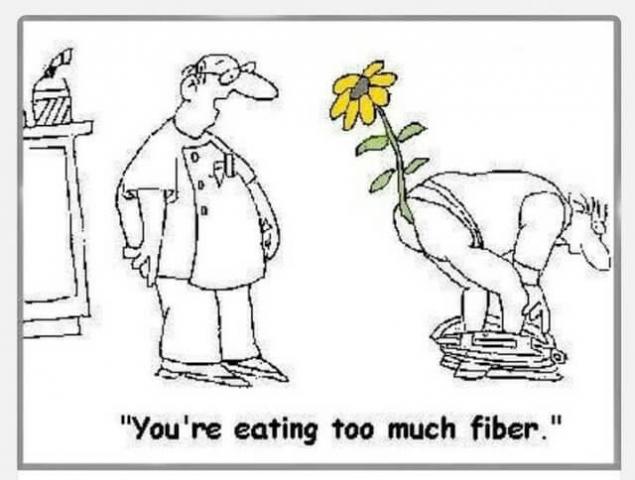
As you can see, you need to work hard to deliver fiber to the diet. And it is not difficult to control her the recommended amount. The problem of excess tissue can relate to people on a vegan diet, rich in legumes, vegetables and rustamovskoye
Author: Andrey Blueskin
This simple tool will erase wrinkles from your face
Disease is not punishment, but the Teacher tells you how to live
P. S. And remember, only by changing their consumption — together we change the world! ©
Source: www.beloveshkin.com/2016/06/opasnosti-upotrebleniya-izbytochnoj-kletchatki.html
The absolute majority of scientific research was not conducted on supplements of fiber, and fruits and vegetables. We cannot equate the bare fiber and the containing fruits and vegetables!!! Increasing the amount of fiber higher than normal does not increase its useful effect, but only leads to health problems.

Norma fiber.
In nutrition it is considered that the daily intake of fiber for an adult should be 25-30 g (or 10-13 g per 1000 kcal). There are two types of fiber: insoluble and soluble. Insoluble intact completely eliminated through the intestinal tract. Her presence has a positive effect on increasing the volume of stool and the regulation of the rhythm of bowel movement. A lot of fiber in wheat bran and flour products from wheat flour.
Now the U.S. has developed some restrictions regarding consumption of food fibers: for men over the age of 50 years, their number should be no more than 38 grams per day, and for those men who have crossed this age limit, it is recommended to reduce this figure to 30 grams. Women who have not reached the 50 year milestone, you should consume 30 GM of fiber and those over 50, it takes less than 21 grams.
Fiber intake above 50 grams per day leads to negative effects!
As for children, the initial dose is 10 GM, to which is added the number of grams equal to the age of the child. For example, 9-year-old child should consume in a day, 10+9, that is 19 GM dietary fiber daily.
Soluble fiber on the one hand, is able to swell in water, hold the water and quickly give a feeling of satiety, and on the other hand, it reduces the absorption of fats, glucose and bile and promotes the growth of normal intestinal microflora. Its a lot of plums, carrots, citrus fruits, legumes.
According to the concepts of nutrition, nutrition in the total number of fiber soluble should not be less than 3/4. In most plant products are the two forms of fiber at the same time.


Fiber enough!
Any little bit of balanced diet contains enough fiber! For example, in a plate of pea soup or beans contains at least 20 grams of fiber – it's almost the daily recommended allowance (!). Therefore, it makes sense to eat foods rich in fiber or to use an excess of whole grain products.
Example of bread: rye Bread brand "Generous". Ingredients: rye flour bakery flour, wheat bran, wheat flour of second grade, drinking water, margarine. Baking yeast, salt, malt, rye. Composition: the Calorie content of these crisps 100 g is 360 kcal, Protein 10 g, fat – 4.5 g, carbohydrates – 70 grams fiber – 18,4 g
Only 100 grams of bread contain more than half the daily value of fiber (!) Not even considering the rest of the diet!

The creation of the myth about fiber.
In 1979, an Irish physician, Dr. Denis Parsons Burkitt published a book "don't forget the fiber," which became an international bestseller. In 1984 the Kellogg Company adds a statement about health on the packaging of your cereal "All-Bran".
In 1990, the U.S. Congress adopts a law on the labelling of foods requires food producers to measure the content of fiber and put information about it on the packaging. In 1990, the American society of cancer the first release recommendations on reducing the risk of cancer, including the advice to eat more fiber.
The myth about fiber is that use of vegetables and fruit is transferred to the fiber (substitution of concepts). The creators and promoters of this myth is that many manufacturers of Breakfast cereals, "of whole grain products, etc. it is claimed that the fiber really reduces the risk of many diseases.
Currently, lobbyists, talking about the benefits of consuming fiber, point to several small-scale studies supporting their arguments that fiber (not vegetables!) helps with heart disease and some other diseases. Unfortunately, the history of medical research has shown again and again that we need to be very careful with the results of small scale studies because they can reflect a simple coincidence.
Fiber and digestive problems.
If your diet dramatically increased the amount of fiber, you may encounter such problems as flatulence, diarrhea, pain and bloating — this causes discomfort.
Here is what microbiologist Paul McNeil Paul McNeil) at the Medical College of Georgia: "When you eat food rich in fiber, it moving along the gastrointestinal tract, injures epithelial cells of the serous membrane. These injuries lead to increased production of mucus, which has soothing and protective properties.". Of course, there is a limit on receiving "coarse" plant foods rich in fiber.
The digestive organs do not produce enzymes capable of degrading the sheath of plant cells. Some microbes of the large intestine (Clostridium, V. cellulosae dissolvens, B. mesentericus vulgatus) have such enzymes and therefore break down cellulose. At the normal rate of movement of food through the digestive tract microbes digest about 3/4 of the entire fiber, if it is taken not in excess.
But there are condition when even normal digestible cellulose are not normally digested. The fact that plant cells are interconnected by a layer of pectin for dissolution which requires first the acid reaction of the gastric juice, and then lightly alkaline duodenum. In the absence or lack NS in gastric juice the cells of digestible fiber (e.g., potatoes, carrots) together, which means they remain undigested.
To protect against mechanical damage caused by undigested food, epithelial cells as adaptation begins to secrete much more mucus. Secreted mucus serves to protect the outer cells of the mucosa. In addition, it promotes rapid recovery of damaged outer membrane and facilitates the movement of food through the digestive tract.
Excess fiber impairs absorption of micronutrients.
Fiber promotes the movement of undigested food through the digestive tract, while reducing the level of assimilation of nutrients by the intestinal wall. If we start to consume more than 50-60 grams of fiber a day, our body will fail to absorb sufficient amounts of the essential trace elements and nutrients before undigested food leaves our body.
Fiber gives a feeling of satiety for a long time, helping us thus to lose weight and keep a desirable body weight. If for us adults, this effect is very favorable, for kids, in case of excessive consumption of dietary fiber, it is not helpful, as it may not be the best way impact on their health. In this situation, the child feels satiated and refuses to eat the amount of healthy food that it needs for normal development and growth.
However, excess dietary fiber (25-40 g/day) can significantly inhibit the absorption of iron, calcium, zinc and other important elements.Especially from an excess of fiber affects children. Soya baby food inhibits the absorption of zinc. And zinc is essential for brain development. Depression, pathological loss of appetite, low birth weight, delayed growth, mental development and amenorrhea – all of them are connected with zinc deficiency, and the first 5 of these symptoms are also associated with iron deficiency.
In England the passion plant food products for children led to a massive epidemic of rickets. And only a return to the diet of dairy and meat products allowed to deal with this deficiency. A leading expert on fiber, Professor David Southgate, believes that infants, children, adolescents, and pregnant women should refrain from the excessive consumption of fiber. These categories of people have a great need in minerals than the rest of the population. Fitini fiber "robbing" the absorption of minerals.
Zinc deficiency, a symptom of which is a significant delay of growth and puberty, was first described in children and male adolescents in Egypt, Iran and Turkey. The diet of the inhabitants of the Middle East usually contains a lot of fiber and Filatov, impeding absorption of zinc.
Deficiency of zinc in the body especially common in countries with low income due to insufficient consumption of foods rich in zinc (mainly foods of animal origin), or because of low suction in connection with the binding of the zinc fiber and fittoni, which are present in cereals, nuts and legumes.
Fiber also reduces fat absorption that, in turn, causes reduction of intake of fat — soluble vitamins- A, D, E and K. There is evidence that plant fiber can reduce the absorption of such compounds as selenium, beta-carotene, and vitamin B2.
Fiber reduces the risk of colorectal cancer.
For example, in the course of their studies failed to identify any relationship between colorectal cancer and intake of dietary fiber or fruits and vegetables. In January 1999, ABC World News reported on a sensational publication.
The New England Journal of Medicine published the results of a massive study of 88 thousand people over 16 years and showed that for prevention of colorectal cancer fiber is useless. This news was printed in the edition of the New York Times.
Scientists testing a hypothesis (note, has not confirmed the hypothesis) Dr. Denis Burkitt, who based on the observations of the food of people in Africa have suggested that the low incidence of rectal cancer associated with the use of fiber.
Harvard Professor Dr. W. Willett reported that fiber intake has no influence on either the incidence of colon cancer or of benign prostatic hyperplasia. The myth about fiber continues to circulate, despite ample evidence that fiber-rich grains are guilty of the emergence of a number of gastrointestinal diseases, including colon cancer.
No one questioned the antioxidant properties of fiber. In recent years more and more talk about the important role of cellulose as the binding and elimination of toxins. In particular, it binds and excretes estrogens and estrogen-like substances. In our time of continuous application of chemicals, the role of fiber is particularly important. It is also important that the fibre prevents sharp rise in blood sugar level.

Along with the results of other studies of colon cancer and breast cancer "Study health of nurses" has created more confusion and was almost completely discredited the idea of the correlation between diet and cancer.
After several decades of work, Professor Walt Willett said: "...increase the consumption of fruits and vegetables in General don't seem as effective way to significantly reduce the risk of cancer... apparently, the benefits from the consumption of these products] is manifested to a greater extent for cardiovascular than for cancer diseases".
Fiber helps to lose weight.
Nutritionists traditionally recommend persons suffering from obesity or having excess body mass, to increase the proportion of dietary fiber in your diet. It is assumed that foods rich in fiber will cause a feeling of fullness due to reflex stimulation of the receptors of the gastric wall and this will allow longer-lasting feeling of satiety due to slow evacuation. Recall that the long chains of polysaccharides that make up dietary fiber are not digested by enzymes the human digestive tract, but can be cleaved under the influence of the intestinal microflora.
For those who want to control your body mass produced special products enriched with dietary fiber, including various candy bars for snacks that are designed to quickly satisfy hunger, but not too high energy value.
However, according to the study, published in July 2012 in the online version of journal of the Academy of Nutrition and Dietetics, the consumption of these products is not too helps to stick to a diet.
To determine the effect of proportion of dietary fiber in the diet on the volume and energy value of consumed food, the researchers offered 22 healthy young women without dietary restrictions at the time of the study, consumed on a daily basis specially manufactured bars.
Of 5 offer 4 varieties contained different dietary fiber (10 g oligofructose, or inulin, or soluble corn fiber or resistant wheat starch), and 1 was a normal chocolate bar.
Every kind of sweets offered to women after dinner, and then after Breakfast the next day. After this, the women dined in a research laboratory, where he assessed their feelings of hunger, satiety, "full stomach" on a standard scale. In addition, the recorded inventory of all food eaten during the day products.
It turned out that in those days, when women ate only "useful" sweets, and other days the volume and energy value of the food consumed remained virtually unchanged. In addition, by interviewing participants of the research, it was found that these bars do not create the additional feeling of satiety and does not affect the sensation of hunger. Of the side effects noted slightly pronounced bloating and flatulence complained mostly after eating fiber.
The excess vegetables also helps weight loss
American scientists undertook to check the validity of the basic recommendations of nutritionists to lose weight, there are 1 to 5 daily servings of fruits and 2-3 servings of vegetables."
The study involved over a thousand people. The results showed that such diets the expected efficiency is not encouraging. The study compared the "vegetable" diet and Mediterranean – based on olive oil and seafood. It turned out, the second worked better.
Moreover, the cores that followed the Mediterranean diet, a 30% resperidal heart attack. Catherine Kaiser – head of the research group – affirms that the simple replacement of conventional products with fruits and vegetables is not effective. Conclusion: now focus on vegetables and fruits, often forget about other equally important elements of the diet.
Excess fiber, cleansing and constipation.
Very often people try to solve the problem of constipation by increasing the amount of fiber. This is wrong. Moreover, the fiber, especially with an insufficient amount of water (2 liters per day) cause constipation by itself. In addition, physical inactivity and sedentary lifestyle are two causes of constipation.
Many doctors and their patients genuinely believe that the engine of the intestinal content is fiber. Indeed, the increase of specific weight of fiber in the diet, in some cases, increases the frequency of bowel movements. However, it does not suspend the need to use laxatives and it won't ease the pain of defecation. Fiber promotes intestinal contents by mechanical pushing. Pure physics, no physiology.
Turned out to be the opposite: recent studies have shown that the restriction of fiber in the diet led to relief of constipation. This applies primarily insoluble fiber. The reason for this effect is that nature has not endowed man with the enzymatic capacity to digest cellulose.
Recently foreign doctors insistently advise to include every day in your diet plenty of fiber because it effectively cleanses the colon almost like a broom that sweeps everything in its path. But this is a huge misconception.
Fiber is probably like properties of sand paper which irritates the intestine and causes him to excrete slime, which partially protects, but also prevents the absorption of nutrients from food. People who for many years included a large amount of fiber in your diet, the intestines are formed scars, which later become the cause of many problems.
If you will sharply begin to increase the intake of fiber, by the same token you don't let your stomach and intestines time to get used to such excess, and this can lead to undesirable effects – diarrhoea, bloating and excessive flatulence.
Experts recommend to increase the intake of fiber gradually over several weeks until the daily dose reaches recommended standards. Besides it is necessary to remember that dietary fiber must enter into your body from a variety of foods – fruits, vegetables, legumes, nuts, cereals, so that your diet meets all the requirements of proper nutrition.
Moderation.
All should comply with the measure. Of course, fiber has a positive effect on various processes in our body, but this does not mean that you should abuse it. If you have no medical contraindications, you can make in your diet the recommended amount of this substance — take advantage of these benefits. There is no need to apply any special supplements — just normal products.
For example (values are for 100 g of product):
- package of brown rice gives 8.7 g of fiber;
- 3 slices rye bread wholemeal — 6.1 g;
- half a Cup of the beans dry is 15.7 g.

As you can see, you need to work hard to deliver fiber to the diet. And it is not difficult to control her the recommended amount. The problem of excess tissue can relate to people on a vegan diet, rich in legumes, vegetables and rustamovskoye
Author: Andrey Blueskin
This simple tool will erase wrinkles from your face
Disease is not punishment, but the Teacher tells you how to live
P. S. And remember, only by changing their consumption — together we change the world! ©
Source: www.beloveshkin.com/2016/06/opasnosti-upotrebleniya-izbytochnoj-kletchatki.html

